七年级英语下册第二单元知识点归纳Unit2单元归纳57438
七年级下册英语unit 2知识点
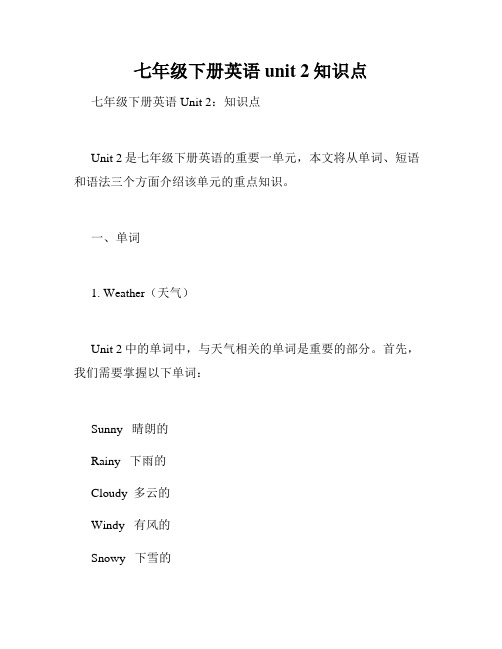
七年级下册英语unit 2知识点七年级下册英语Unit 2:知识点Unit 2是七年级下册英语的重要一单元,本文将从单词、短语和语法三个方面介绍该单元的重点知识。
一、单词1. Weather(天气)Unit 2中的单词中,与天气相关的单词是重要的部分。
首先,我们需要掌握以下单词:Sunny 晴朗的Rainy 下雨的Cloudy 多云的Windy 有风的Snowy 下雪的除此之外,我们还需要理解一些组合表述,例如:Nice weather 晴朗的天气Bad weather 恶劣的天气Warm weather 暖和的天气Cold weather 寒冷的天气2. Months(月份)在描述天气时,月份也是一个重要的参考点。
以下是英语中的月份:January 一月February 二月March 三月April 四月May 五月June 六月July 七月August 八月September 九月October 十月November 十一月December 十二月二、短语1. Talk about (谈论)在Unit 2的内容中,描述天气是一个非常重要的部分。
我们可以使用“talk about”这个短语来讲述天气。
例如:Let's talk about the weather today.(让我们来谈一谈今天的天气吧)2. Look for(寻找)在英语中,如果我们想要寻找某个地方或物品,可以使用“look for”这个短语。
例如:I am looking for my phone.(我正在寻找我的手机)三、语法1. Yes/No Questions在英语中,对于某些问题,我们需要使用“Yes/No”来回答。
此时,我们需要使用一种语法结构,即“Do/Does/Did”+主语+动词原形。
例如:Do you like soccer?(你喜欢足球吗?)2、可以,应该和不能做某事在英语中,有时我们需要描述一个人是否可以、应该或者不能做某件事情。
unit2七年级下册英语知识点
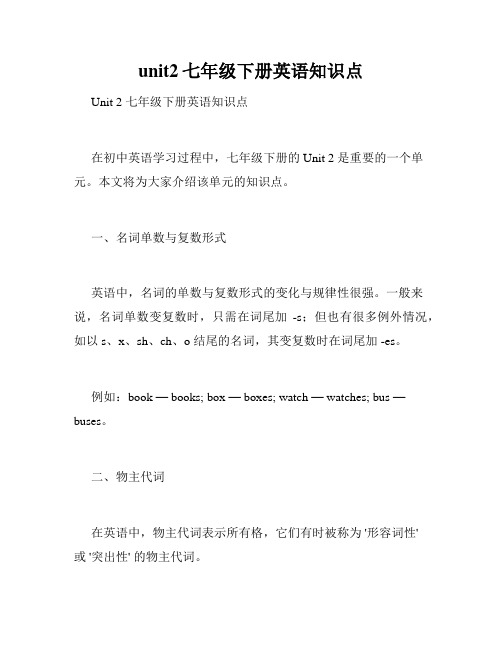
unit2七年级下册英语知识点Unit 2 七年级下册英语知识点在初中英语学习过程中,七年级下册的 Unit 2 是重要的一个单元。
本文将为大家介绍该单元的知识点。
一、名词单数与复数形式英语中,名词的单数与复数形式的变化与规律性很强。
一般来说,名词单数变复数时,只需在词尾加-s;但也有很多例外情况,如以 s、x、sh、ch、o 结尾的名词,其变复数时在词尾加 -es。
例如:book — books; box — boxes; watch — watches; bus —buses。
二、物主代词在英语中,物主代词表示所有格,它们有时被称为 '形容词性'或 '突出性' 的物主代词。
例如:我的— my;你的— your;他/她的— his/her;我们的— our;你们的— your;他们/她们的— their。
注意:表示单数所有格时,物主代词的后面要加上名词或名词短语的复数形式。
如:My father's car(我父亲的车)。
三、可数名词与不可数名词可数名词指的是可以计数的单元,如 book、pen、girl 等,它们可以用数量词来进行数量的描述;不可数名词指的是无法具体数出的名词,如 water、milk、air 等,它们无法用数量词来进行数量的描述。
注意:不可数名词前不能加 a/an;可数名词前要加 a/an。
四、there be 句型英语中有一个特殊的句型叫做there be 句型,它的基本形式为:there be + 名词/形容词/介词短语/副词。
例如:There is a book on the table.(桌子上有一本书。
)五、如何提问在英语中,我们有不同的疑问词用于问不同的问题。
例如:what(什么),who(谁),where(哪里)等。
为了构成正确的疑问句,我们需要将疑问词放在句首。
例如:What's your name?(你叫什么名字?)Who is your teacher?(你的老师是谁?)Where do you live?(你住在哪里?)以上就是七年级下册英语 Unit 2 的知识点了。
七年级英语下册unit2知识点总结
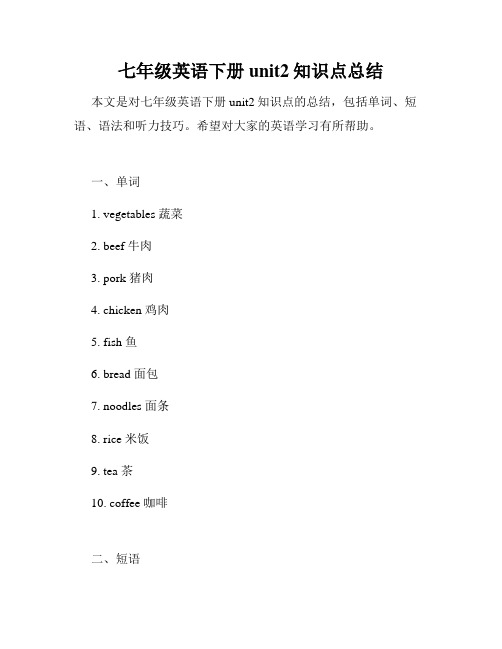
七年级英语下册unit2知识点总结本文是对七年级英语下册unit2知识点的总结,包括单词、短语、语法和听力技巧。
希望对大家的英语学习有所帮助。
一、单词
1. vegetables 蔬菜
2. beef 牛肉
3. pork 猪肉
4. chicken 鸡肉
5. fish 鱼
6. bread 面包
7. noodles 面条
8. rice 米饭
9. tea 茶
10. coffee 咖啡
二、短语
1. have for breakfast/lunch/dinner 早/午/晚餐吃什么
2. be good for 对……有好处
3. eat a balanced diet 饮食平衡
4. drink milk 喝牛奶
5. in the morning/afternoon/evening 早晨/下午/晚上
三、语法
1. 动词的时态:一般现在时、一般过去时、现在进行时
2. 人称代词的主格和宾格
3. 数词的用法
4. 物主代词的用法
四、听力技巧
1. 注意听题,认真听录音
2. 选项一般是听力内容的重要信息,要认真分析每个选项
3. 注意语音、语调和音调,了解英语语音规律
4. 练习不同类型的听力,比如听快读、听口语、听新闻等。
以上就是七年级英语下册unit2知识点的总结。
希望大家认真学习,掌握这些知识点,提高自己的英语水平。
七年级下英语unit2知识点总结

七年级下英语unit2知识点总结七年级下英语Unit 2知识点总结Unit 2是七年级下英语课程的第二单元,主要涉及到动物世界这一主题。
本文将对该单元的知识点进行总结,帮助同学们更好地掌握学习内容。
一、动物分类1.脊椎动物:有脊椎的动物,如鱼、鸟、爬行动物和哺乳动物等。
2.无脊椎动物:没有脊椎的动物,如昆虫、蜗牛、海星等。
3.冷血动物:体温随环境变化而变化的动物,如爬行动物、鱼类等。
4.温血动物:体温不受环境影响而保持恒定的动物,如哺乳动物、鸟类等。
5.肉食动物:以其他动物为食的动物,如老虎、狮子等。
6.植食动物:以植物为食的动物,如大象、牛等。
二、动物名称1.哺乳动物:mammal2.爬行动物:reptile3.两栖动物:amphibian4.鸟类:bird5.鱼类:fish6.昆虫:insect7.节肢动物:arthropod8.蜗牛:snail9.蛇:snake10.乌龟:turtle三、动物特征1.身体结构:不同种类的动物有着不同的身体结构,如长颈鹿的长脖子、猴子的尾巴等。
2.群居状态:有些动物喜欢群居,如蚂蚁、蜜蜂等。
3.食性:不同种类的动物有着各自的食性,如肉食动物、植食动物等。
4.习性:不同种类的动物有着各自的习性,如猫喜欢捉老鼠、鸟儿喜欢建巢等。
5.生命周期:不同种类的动物有着各自的生命周期,如蚕的孵化、成长、变态等。
四、谈论动物1.外貌:描述动物的外貌特征,如颜色、体形等。
2.习性:描述动物的生活习性,如鸟儿筑巢、狮子捕猎等。
3.生存环境:描述动物的生存环境以及它们如何适应环境生存。
4.动物保护:谈论动物保护的重要性,保护动物的方法以及自己如何做到爱护动物。
五、语法本单元语法主要涉及形容词(Adjectives)、比较级和最高级(Comparative and superlative)。
1.形容词:英语中形容词通常在名词前面,用来描述名词的特征。
2.比较级:用于比较两个人或物的级别,规则是在形容词后加“-er”,如taller、faster等。
七年级下册unit2知识点归纳

七年级下册unit2知识点归纳七年级下册英语第二单元主要学习了一些关于日常活动和时间的词汇和短语。
以下是本单元涉及到的一些关键知识点的归纳总结。
一、时间1. 时间的表达方式时间的表达方式主要有以下几种:数字、点钟(o’clock)、半小时(half)、表示分钟的数字、上午(AM)、下午(PM)等。
比如,你可以用以下方式表达时间:- It’s 4 o’clock.(现在是4点。
)- It’s half past two.(现在是两点半。
)- It’s ten to six.(现在差十分六点。
)- It’s a quarter to nine.(现在差15分9点。
)- It’s twenty past twelve.(现在是十二点二十分。
)2. 时间的询问与回答询问时间时可以说:What’s the time? 或者What time is it? 等。
回答时就可以用上述时间表达方式进行回答。
二、日常活动在日常活动的学习中,我们需要学会如何表达一些常见的活动和注意事项。
1. 日常活动一些常见的日常活动包括:get up(起床)、havebreakfast/lunch/dinner(吃早饭/午饭/晚饭)、go to school(上学)、do homework(做作业)、watch TV(看电视)等。
2. 注意事项在表达注意事项时,我们需要掌握如何表达禁止和提醒。
比如:- Don’t be late.(不要迟到。
)- Keep quiet in the library.(在图书馆中保持安静。
)三、一般现在时在学习日常活动时,需要掌握一般现在时的用法。
一般现在时用于表示经常性、习惯性或客观事实。
比如:- I go to school by bus.(我坐公交车去学校。
)- He often reads books in the library.(他经常在图书馆看书。
)四、词汇在本单元的学习中,我们也需要掌握一些词汇。
七年级下册英语unit2知识点归纳
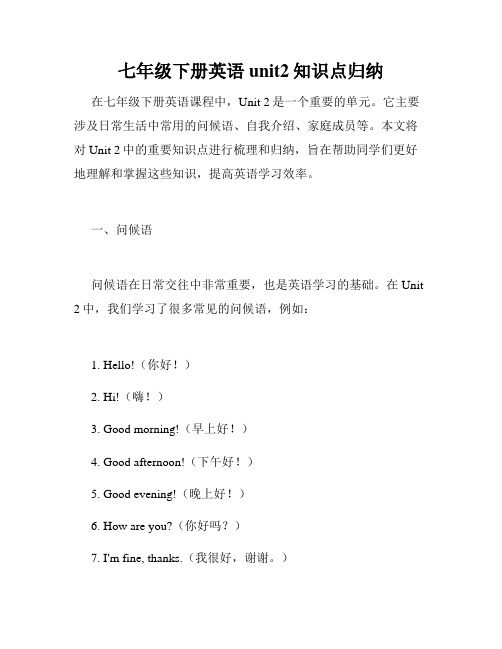
七年级下册英语unit2知识点归纳在七年级下册英语课程中,Unit 2是一个重要的单元。
它主要涉及日常生活中常用的问候语、自我介绍、家庭成员等。
本文将对Unit 2中的重要知识点进行梳理和归纳,旨在帮助同学们更好地理解和掌握这些知识,提高英语学习效率。
一、问候语问候语在日常交往中非常重要,也是英语学习的基础。
在Unit 2中,我们学习了很多常见的问候语,例如:1. Hello!(你好!)2. Hi!(嗨!)3. Good morning!(早上好!)4. Good afternoon!(下午好!)5. Good evening!(晚上好!)6. How are you?(你好吗?)7. I'm fine, thanks.(我很好,谢谢。
)8. Nice to meet you!(很高兴见到你!)9. See you!(再见!)以上是常见的几种问候语,大家可以根据不同场合进行使用。
需要注意的是,在英语中,问候语通常要比中文更加礼貌。
二、自我介绍自我介绍是我们在日常生活中必不可少的一部分,也是英语学习中的重点。
在Unit 2中,我们学习了如何进行自我介绍,包括以下内容:1. My name is…(我的名字是…)2. I’m from…(我来自…)3. I’m in Class…(我在…班)4. Nice to meet you!(很高兴见到你!)在进行自我介绍的时候,可以根据个人情况适当添加一些信息,比如年龄、爱好等。
三、家庭成员家庭成员是我们生活中最重要的一部分。
在Unit 2中,我们学习了如何用英语表达父母、祖父母、兄弟姐妹等家庭成员,包括以下内容:1. father(父亲)2. mother(母亲)3. grandfather(祖父)4. grandmother(祖母)5. brother(兄弟)6. sister(姐妹)需要注意的是,这些词语在口语中有时候会缩写,比如father 可以说成dad,mother可以说成mom。
七年级下册英语unit2知识点
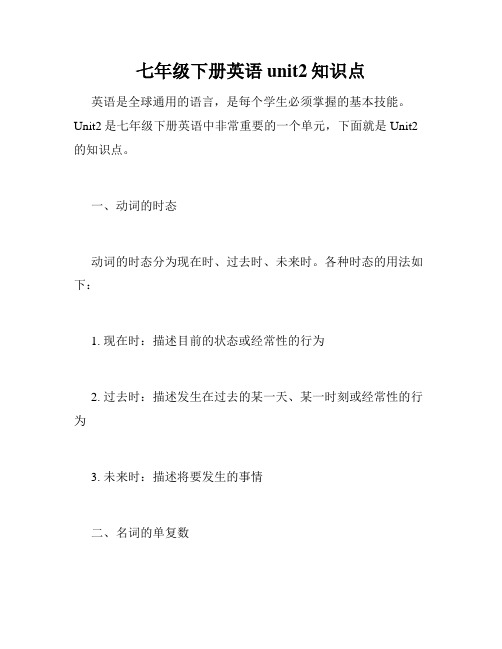
七年级下册英语unit2知识点英语是全球通用的语言,是每个学生必须掌握的基本技能。
Unit2是七年级下册英语中非常重要的一个单元,下面就是Unit2的知识点。
一、动词的时态动词的时态分为现在时、过去时、未来时。
各种时态的用法如下:1. 现在时:描述目前的状态或经常性的行为2. 过去时:描述发生在过去的某一天、某一时刻或经常性的行为3. 未来时:描述将要发生的事情二、名词的单复数大部分单数名词加-s表示复数,以-s, -sh, -ch, -x结尾的名词加-es表示复数,以-y结尾的名词变y为i, 再加-es表示复数。
1. 以-s结尾的名词复数形式举例:books, desks, pens等2. 以-s,-sh,-ch,-x结尾的名词复数形式举例:buses, dishes, churches, boxes等3. 以-y结尾的名词复数形式举例:babies, parties, cities等三、形容词的比较级和最高级形容词的比较级和最高级分别是用来描述两个事物之间的程度高低和三个以上事物之间的排序。
1. 比较级:表示两者相比较的程度2. 最高级:表示在一类人或物中的排名最高的事物四、副词的用法副词是修饰动词、形容词、副词的单词,表示时间、地点、程度等,在句子中位置一般在动词或形容词之后。
五、介词的用法介词表示人、物之间关系的单词,放在名词或代词前面,构成介词短语,可以表示时间、地点、方向等。
六、情态动词情态动词表示说话人的态度、意愿等,不表时态,也不单数复数、人称等变化。
七、固定短语下面是一些常用的固定短语:1. look after 照顾;照管2. take care of照顾;保护3. get along和睦相处;过得去4. look up查找5. take a message留话以上就是Unit2的知识点总结,希望能够对你的英语学习有所帮助!。
七年级下unit2知识点总结
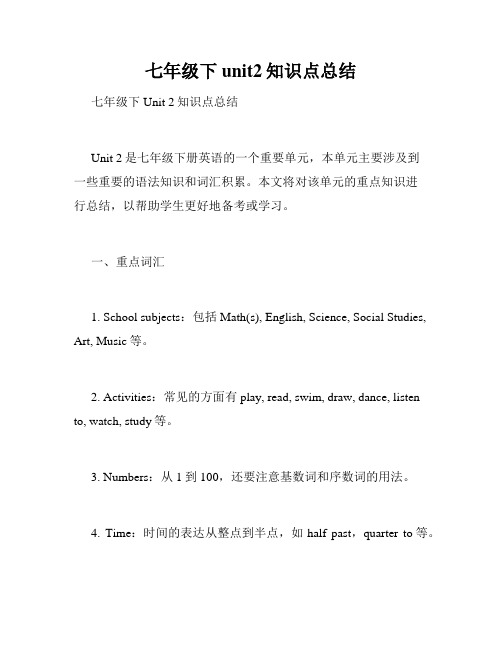
七年级下unit2知识点总结七年级下Unit 2知识点总结Unit 2是七年级下册英语的一个重要单元,本单元主要涉及到一些重要的语法知识和词汇积累。
本文将对该单元的重点知识进行总结,以帮助学生更好地备考或学习。
一、重点词汇1. School subjects:包括Math(s), English, Science, Social Studies, Art, Music等。
2. Activities:常见的方面有play, read, swim, draw, dance, listen to, watch, study等。
3. Numbers:从1到100,还要注意基数词和序数词的用法。
4. Time:时间的表达从整点到半点,如half past,quarter to等。
5. Directions:涉及到方位词和表达方向的词汇,如north, south, east, west等。
6. Verbs of liking and disliking:常见的有like, love, enjoy, hate, dislike等。
7. Modal verbs:包括can, could, may, must, should等。
8. Prepositions of time and place:如in, on, at, under, over等。
二、重点语法1. 介绍人物(人的外貌和性格)的用法:例如:She has long hair and a friendly smile. She is kind and helpful.2. 现在进行时的用法:现在进行时表示正在进行或发生的动作,构成:主语 +am/is/are + 现在分词。
例如:He is playing soccer with his friends. She is singing a song in the classroom.3. 能力和建议:能力:can/ can’t, be able to例如:I can dance very well. She can’t swim.建议:should/ shouldn’t, have to/ don’t have to例如:You should study hard for the exam. You don’t have t o clean your room today.4. 一般现在时:一般现在时表示经常性或习惯性的动作或状态,构成:主语 +动词原形。
最全面人教版七年级下册英语第二单元知识点归纳总结
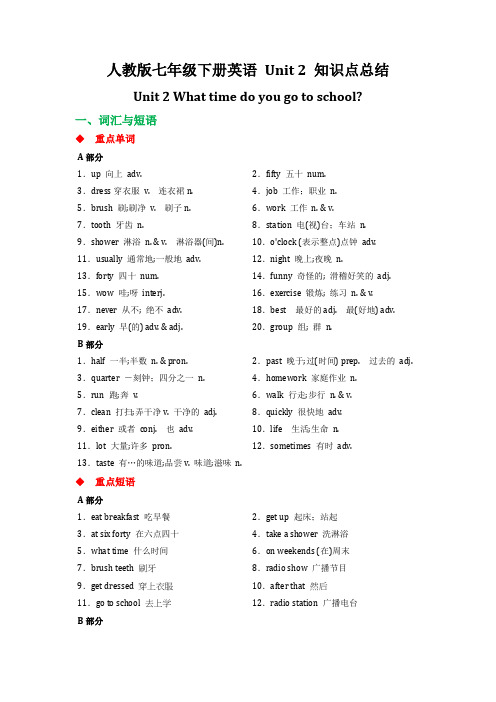
人教版七年级下册英语Unit 2 知识点总结Unit 2 What time do you go to school?一、词汇与短语◆重点单词A部分1.up 向上adv.2.fifty 五十num.3.dress穿衣服v. 连衣裙n.4.job 工作;职业n.5.brush 刷;刷净v. 刷子n.6.work 工作n. & v.7.tooth 牙齿n.8.station 电(视)台;车站n. 9.shower 淋浴n. & v. 淋浴器(间)n.10.o'clock (表示整点)点钟adv. 11.usually 通常地;一般地adv.12.night 晚上;夜晚n.13.forty 四十num.14.funny 奇怪的; 滑稽好笑的adj. 15.wow 哇;呀interj.16.exercise 锻炼; 练习n. & v. 17.never 从不; 绝不adv.18.best 最好的adj. 最(好地) adv. 19.early 早(的) adv. & adj.20.group 组; 群n.B部分1.half 一半;半数n. & pron.2.past 晚于;过(时间) prep. 过去的adj. 3.quarter ―刻钟;四分之一n.4.homework 家庭作业n.5.run 跑;奔v.6.walk 行走;步行n. & v.7.clean 打扫;弄干净v. 干净的adj.8.quickly 很快地adv.9.either 或者conj. 也adv.10.life 生活;生命n.11.lot 大量;许多pron.12.sometimes 有时adv.13.taste 有…的味道;品尝v. 味道;滋味n.◆重点短语A部分1.eat breakfast 吃早餐2.get up 起床;站起3.at six forty 在六点四十4.take a shower 洗淋浴5.what time 什么时间6.on weekends (在)周末7.brush teeth 刷牙8.radio show 广播节目9.get dressed 穿上衣服10.after that 然后11.go to school 去上学12.radio station 广播电台B部分1.go home 回家2.go to Bob's home 去鲍勃家3.do (one's) homework 做作业4.clean sb.'s room 打扫某人的房间5.eat dinner 吃晚饭6.half an hour 半个小时7.go to bed 上床睡觉8.get home 到家9.play/do sports 做运动10.lots of 大量;许多11.a healthy life 一个健康的生活12.be good for 对…有好处13.take a walk 散步;走一走14.taste good 尝起来味道好15.get home from school 从学校回到家16.at a quarter past three in the afternoon 在下午三点一刻17.either…or…要么…要么…; 或者…或者…18.at a quarter to seven in the evening 在晚上差一刻七点19.at half past six in the morning 在早晨六点半◆重点句子A部分1.—What time do you usually get up,Rick? 里克,你通常几点起床?—I usually get up at six thirty. 我通常6:30起床。
七年级下册英语unit2知识点人教版

七年级下册英语unit2知识点人教版本文将针对七年级下册英语unit2的知识点进行详细的介绍,涵盖重点单词、基本语法以及常用句型。
请仔细阅读以下内容,以便更好地应对英语学习中的考试和日常交流。
一、重点单词1. cousin(堂/表)兄弟姐妹2. aunt 姑妈/阿姨3. uncle 叔叔4. grandparents 祖父母5. school 学校6. grade 年级7. class 班级8. teacher 老师9. student 学生10. pen pal 笔友二、基本语法1. There be 句型“There be” 句型是英语中比较基础的存在句型,在句中表示存在的事物。
其中“there”意为“有”,“be”是动词“是”的变化形式,通常与单数或复数名词连用。
例如:There is a book on the table. 桌子上有一本书。
There are three apples in the bag. 袋子里有三个苹果。
2. 形容词的比较级和最高级初中英语的前两年是学习形容词级别的时期,在七年级下册,我们需要学习的是形容词的比较级和最高级,简单来说,在两个或更多的事物之间进行比较时使用。
比较级的构成方法是在形容词后面加-er,最高级则是在形容词后面加-est。
例如:I am taller than my sister. 我比我妹妹高。
He is the tallest in his class. 他的班级里是最高的。
三、常用句型1. What’s your name? (你叫什么名字?)2. How old are you? (你多大了?)3. Where are you from? (你来自哪里?)4. My name is … (我的名字是…)5. I’m from … (我来自…)6. Nice to meet you. (很高兴见到你)7. This is my cousin. (这是我的表兄妹)以上句型都是我们在日常生活中会经常用到,希望大家能够好好掌握它们,提高英语口语能力。
英语七下unit2知识点总结归纳
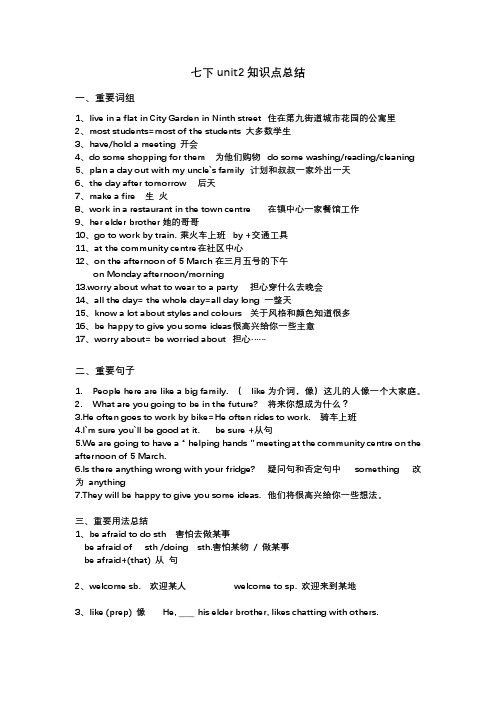
七下unit2知识点总结一、重要词组1、live in a flat in City Garden in Ninth street 住在第九街道城市花园的公寓里2、most students=most of the students 大多数学生3、have/hold a meeting 开会4、do some shopping for them 为他们购物do some washing/reading/cleaning5、plan a day out with my uncle`s family 计划和叔叔一家外出一天6、the day after tomorrow 后天7、make a fire 生火8、work in a restaurant in the town centre 在镇中心一家餐馆工作9、her elder brother 她的哥哥10、go to work by train. 乘火车上班by +交通工具11、at the community centre 在社区中心12、on the afternoon of 5 March 在三月五号的下午on Monday afternoon/morning13.worry about what to wear to a party 担心穿什么去晚会14、all the day= the whole day=all day long 一整天15、know a lot about styles and colours 关于风格和颜色知道很多16、be happy to give you some ideas 很高兴给你一些主意17、worry about= be worried about 担心……二、重要句子1. People here are like a big family. (like 为介词,像)这儿的人像一个大家庭。
2. What are you going to be in the future? 将来你想成为什么?3.He often goes to work by bike=He often rides to work. 骑车上班4.I`m sure you`ll be good at it. be sure +从句5.We are going to have a “ helping hands” meeting at the community centre on the afternoon of 5 March.6.Is there anything wrong with your fridge? 疑问句和否定句中something 改为anything7.They will be happy to give you some ideas. 他们将很高兴给你一些想法。
unit2七年级下册知识点

unit2七年级下册知识点Unit 2 七年级下册知识点在七年级下册的学习中,Unit 2 是一个非常重要的学习单元。
在这个单元中,学生将学习到很多有用的知识点。
下面,本文将为大家介绍 Unit 2 七年级下册的知识点。
第一部分:语法1. 现在进行时现在进行时表达的是此刻正在进行的动作。
其结构为“主语 + am/is/are + 现在分词”。
例如:He is swimming in the pool.(他正在游泳)They are watching TV.(他们正在看电视)2. 一般现在时一般现在时用来描述经常发生的或真理性的事情。
其结构为“主语 + 动词原形(第三人称单数 + s)”。
例如:I usually get up at 6 o'clock.(我通常在 6 点起床)He often plays basketball after school.(他放学后经常打篮球)3. 特殊疑问句特殊疑问句以疑问词(who, what, where, when, why, how等)开头,用于询问特定的信息。
例如:What time do you usually go to bed?(你通常几点睡觉?)Where is the nearest bookstore?(最近的书店在哪里?)第二部分:词汇1. 形容词形容词用于描述人、事物的特征和特点。
例如:She is a beautiful girl.(她是一个漂亮的女孩。
)The weather today is terrible.(今天的天气很糟糕。
)2. 副词副词用于描述动作或状态的特征和特点。
例如:He runs very fast.(他跑得非常快。
)She sings beautifully.(她唱得很美。
)3. 名词名词用于指一般的人、事物、概念和抽象概念等。
例如:Tom is a student.(汤姆是一名学生。
)The book on the table is very interesting.(桌子上的书非常有趣。
七年级英语人教版下册Unit2重点知识点归纳
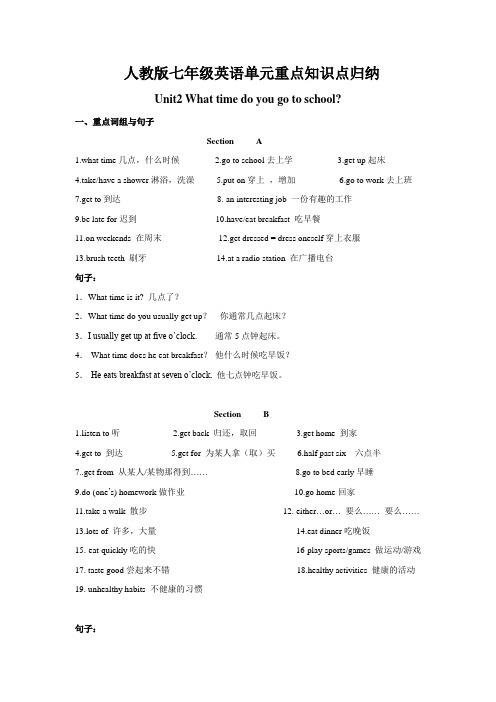
人教版七年级英语单元重点知识点归纳Unit2 What time do you go to school?一、重点词组与句子Section A1.what time几点,什么时候2.go to school去上学3.get up起床4.take/have a shower淋浴,洗澡5.put on穿上,增加6.go to work去上班7.get to到达8. an interesting job 一份有趣的工作9.be late for迟到10.have/eat breakfast 吃早餐11.on weekends 在周末12.get dressed = dress oneself穿上衣服13.brush teeth 刷牙14.at a radio station 在广播电台句子:1.What time is it? 几点了?2.What time do you usually get up?你通常几点起床?3.I usually get up at five o’clock. 通常5点钟起床。
4.-What time does he eat breakfast?他什么时候吃早饭?5.-He eats breakfast at seven o’clock. 他七点钟吃早饭。
Section B1.listen to听2.get back 归还,取回3.get home 到家4.get to 到达5.get for 为某人拿(取)买6.half past six 六点半7..get from 从某人/某物那得到……8.go to bed early早睡9.do (one’s) homework做作业10.go home回家11.take a walk 散步12. either…or…要么……要么……13.lots of 许多,大量14.eat dinner吃晚饭15. eat quickly吃的快16 play sports/games 做运动/游戏17. taste good尝起来不错18.healthy activities 健康的活动19. unhealthy habits 不健康的习惯句子:1.When do students usually eat dinner?学生们通常什么时候吃晚餐?2.I don’t have much time for breakfast.我没有许多时间吃早餐。
七年级下次英语unit2知识点
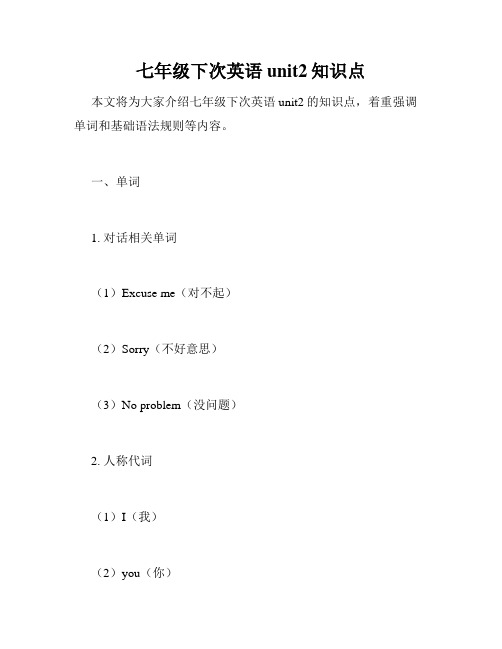
七年级下次英语unit2知识点本文将为大家介绍七年级下次英语unit2的知识点,着重强调单词和基础语法规则等内容。
一、单词1. 对话相关单词(1)Excuse me(对不起)(2)Sorry(不好意思)(3)No problem(没问题)2. 人称代词(1)I(我)(2)you(你)(3)he(他)(4)she(她)(5)it(它)(6)we(我们)(7)they(他们)3. 动词(1)be,是;有(2)study,学习(3)speak,说话二、基础语法规则1. 一般现在时一般现在时表示经常性、习惯性、普遍性等意义,通常使用S+V+O的形式构成。
例如:I study English every day.(我每天都学英语。
)They speak English very well.(他们说英语说得很好。
)2. 疑问句、否定句和回答疑问句的构成为“疑问词+助动词+主语+动词+其他成分”。
例如:What do you like to do?(你喜欢做什么?)否定句的构成是在助动词之后加not。
例如:I do not like to study.(我不喜欢学习。
)肯定回答可用Yes开头,否定回答可用No开头。
例如:—Do you like to study Chinese?—Yes,I do. / No,I don’t.三、语法练习根据下面的提示编写对话。
提示:Linda 和Tom在教室里。
Linda: Excuse me,Tom.(请问,Tom。
)Tom: Yes?(有事吗?)Linda: Can you help me?(你可以帮我吗?)Tom: Sure,what do you want me to do?(当然可以,你想让我做什么?)Linda: Can you speak French?(你会说法语吗?)Tom: No,I can’t.(不会。
)Linda: No problem. Thank you.(没问题。
七年级下册unit2英语知识点总结
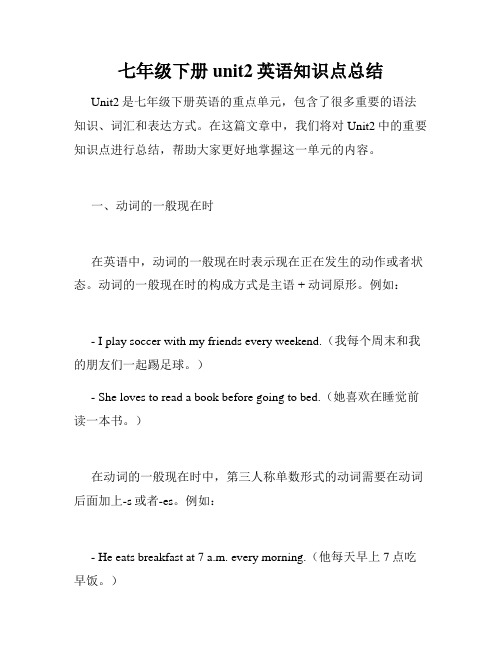
七年级下册unit2英语知识点总结Unit2是七年级下册英语的重点单元,包含了很多重要的语法知识、词汇和表达方式。
在这篇文章中,我们将对Unit2中的重要知识点进行总结,帮助大家更好地掌握这一单元的内容。
一、动词的一般现在时在英语中,动词的一般现在时表示现在正在发生的动作或者状态。
动词的一般现在时的构成方式是主语 + 动词原形。
例如:- I play soccer with my friends every weekend.(我每个周末和我的朋友们一起踢足球。
)- She loves to read a book before going to bed.(她喜欢在睡觉前读一本书。
)在动词的一般现在时中,第三人称单数形式的动词需要在动词后面加上-s或者-es。
例如:- He eats breakfast at 7 a.m. every morning.(他每天早上7点吃早饭。
)- She reads a lot of books every month.(她每个月读很多书。
)二、there be句型there be句型是英语中常用的一种句型,用于描述某个地点存在着某些物品。
句型的构成方式为:there + be动词+ 物品。
例如:- There is a book on the table.(桌子上有一本书。
)- There are some apples in the basket.(篮子里有一些苹果。
)需要注意的是,当there be句型的主语是单数时,使用is;当主语是复数时,使用are。
三、形容词的比较级和最高级形容词的比较级用于比较两个人或物之间的差异,常用的构成方式是在形容词后面加上-er。
例如:- This book is more interesting than that one.(这本书比那本书更有趣。
)- My sister is taller than me.(我的姐姐比我高。
七年级下英语unit2知识点归纳

七年级下英语unit2知识点归纳Unit2是一学期英语课程中重要的一部分,本单元主要介绍了一些基础的英语语法和词汇。
下面我们来对Unit2的知识点做个简单的归纳。
一、情态动词情态动词是英语语法中很重要的一部分,它们可以用于表达某种根据语境而定的情态语气。
在Unit2中,我们学习了“can”和“must”这两种情态动词。
它们分别表示能力和必须做的事情。
例如:1. I can swim.(我会游泳。
)2. We must do our homework now.(我们现在必须做我们的作业了。
)二、短语动词短语动词是由一个动词和一个或多个介词、副词、副动词等组成的短语,它们的意思与单独使用该动词时有所不同。
在Unit2中,我们学习了“look after”和“come back”这两个短语动词。
例如:1. Who will look after the dogs when we are away?(我们离开时,谁会照看这些狗?)2. Jack will come back at 5 o'clock.(杰克将在5点钟回来。
)三、反意疑问句反意疑问句是由一个陈述句和一个短语构成,用于表达询问或确认。
通常反意疑问句的意思与其所在的陈述句产生反义关系。
在Unit2中,我们学习了如何构建反意疑问句。
例如:1. You don't like coffee, do you?(你不喜欢咖啡,是吗?)2. Your father is a doctor, isn't he?(你的父亲是医生,对吗?)四、一般过去时态一般过去时态是用于表达已经发生的动作或事件的时间。
在Unit2中,我们学习了如何构建一般过去时态。
例如:1. I studied English last night.(我昨晚学习了英语。
)2. They visited Shanghai last year.(他们去年访问了上海。
)五、名词名词是用于表示某种事物、人或想象的概念的词语。
七年级英语下册第二单元知识点归纳Unit2单元归纳
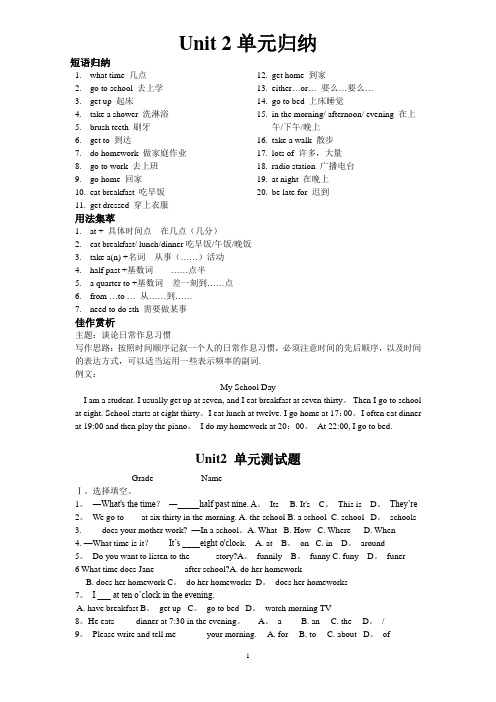
Unit 2单元归纳短语归纳1.what time 几点2.go to school 去上学3.get up 起床4.take a shower 洗淋浴5.brush teeth 刷牙6.get to 到达7.do homework 做家庭作业8.go to work 去上班9.go home 回家10.eat breakfast 吃早饭11.get dressed 穿上衣服12.get home 到家13.either…or…要么…要么…14.go to bed 上床睡觉15.in the morning/ afternoon/ evening 在上午/下午/晚上16.take a walk 散步17.lots of 许多,大量18.radio station 广播电台19.at night 在晚上20.be late for 迟到用法集萃1.at + 具体时间点在几点(几分)2.eat breakfast/ lunch/dinner吃早饭/午饭/晚饭3.take a(n) +名词从事(……)活动4.half past +基数词……点半5. a quarter to +基数词差一刻到……点6.from …to …从……到……7.need to do sth 需要做某事佳作赏析主题:谈论日常作息习惯写作思路:按照时间顺序记叙一个人的日常作息习惯,必须注意时间的先后顺序,以及时间的表达方式,可以适当运用一些表示频率的副词.例文:My School DayI am a student. I usually get up at seven, and I eat breakfast at seven thirty。
Then I go to school at eight. School starts at eight thirty。
I eat lunch at twelve. I go home at 17:00。
人教版英语七年级下册Unit2知识点精析+课文注释

人教版英语七年级下册Unit2知识点精析+课文注释Section A重点单词dress穿衣服;连衣裙up向上brush刷;刷净;刷子tooth牙齿shower淋浴;淋浴器(间)usually 通常地;一般地forty 四十never从不;绝不fifty五十early早(的)job工作;职业work工作o'clock(表示整点)……点钟station电(视)台;车站night晚上;夜晚funny 奇怪的;滑稽好笑的exercise锻炼;练习best最好的;最好地;最group组;群重点短语get up起床;站起go to school去上学get dressed 穿上衣服brush teeth 刷牙eat breakfast 吃早饭take a shower 洗淋浴radio station 广播电台at night 在晚上go to work 去上班be late for 迟到on weekends (在)周末重点句型1.-What time do you usually get up,Rick?里克,你通常几点起床?-I usually get up at six thirty.我通常6:30起床。
2.I never get up so early.我从不那么早起床。
3.That's funny time for breakfast!那个时间吃早饭真有意思呀!4. After that, I usually exercise at about ten twenty.在那之后,我通常在10:20左右锻炼。
Section B重点单词half一半;半数past晚于;过(时间);过去的quarter一刻钟;四分之一homework家庭作业clean打扫;弄干净;干净的run跑;奔walk行走;步行quickly 很快地either或者;也(用在否定词组后)lot大量;许多sometimes有时taste有……的味道;品尝;味道;滋味life生活;生命重点短语do(one’s) homework做作业go to bed 上床睡觉take a walk 散步;走一走play sports 做运动get home 到家either...or... 要么......要么......;或者......或者......lots of 大量;许多from...to...从......到......重点句型1.When do students usually eat dinner?学生们通常什么时候吃晚饭?2. In the evening, I either watch TV or play computer games.在晚上,我要么看电视,要么玩电脑游戏。
- 1、下载文档前请自行甄别文档内容的完整性,平台不提供额外的编辑、内容补充、找答案等附加服务。
- 2、"仅部分预览"的文档,不可在线预览部分如存在完整性等问题,可反馈申请退款(可完整预览的文档不适用该条件!)。
- 3、如文档侵犯您的权益,请联系客服反馈,我们会尽快为您处理(人工客服工作时间:9:00-18:30)。
Unit 2单元归纳短语归纳1.what time 几点2.go to school 去上学3.get up 起床4.take a shower 洗淋浴5.brush teeth 刷牙6.get to 到达7.do homework 做家庭作业8.go to work 去上班9.go home 回家10.eat breakfast 吃早饭11.get dressed 穿上衣服12.get home 到家13.either…or…要么…要么…14.go to bed 上床睡觉15.in the morning/ afternoon/ evening 在上午/下午/晚上16.take a walk 散步17.lots of 许多,大量18.radio station 广播电台19.at night 在晚上20.be late for 迟到用法集萃1.at + 具体时间点在几点(几分)2.eat breakfast/ lunch/dinner吃早饭/午饭/晚饭3.take a(n) +名词从事(……)活动4.half past +基数词……点半5. a quarter to +基数词差一刻到……点6.from …to …从……到……7.need to do sth 需要做某事佳作赏析主题:谈论日常作息习惯写作思路:按照时间顺序记叙一个人的日常作息习惯,必须注意时间的先后顺序,以及时间的表达方式,可以适当运用一些表示频率的副词。
例文:My School DayI am a student. I usually get up at seven, and I eat breakfast at seven thirty. Then I go to school at eight. School starts at eight thirty. I eat lunch at twelve. I go home at 17:00. I often eat dinner at 19:00 and then play the piano. I do my homework at 20:00. At 22:00, I go to bed.Unit2 单元测试题Grade________ Name ________Ⅰ.选择填空。
1. ―What's the time ―_____half past nine. A. Its B. It's C. This is D. They're2. We go to ___ at six thirty in the morning. A. the schoolB. a schoolC. schoolD. schools3. —___ does your mother work—In a . What B. How C. Where D. When4. —What time is it —It's ____eight o'clock. A. at B. on C. in D. around5. Do you want to listen to the _____ storyA. funnily B. funny C. funy D. funer6 What time does Jane ______ after schoolA. do her homeworkB. does her homeworkC. do her homeworksD. does her homeworks7. I ___ at ten o'clock in the evening.A. have breakfastB. get upC. go to bedD. watch morning TVeats ____ dinner at 7:30 in the evening. A. a B. an C. the D. /9. Please write and tell me ______ your morning. A. for B. to C. about D. of10. ____ Lucy and Lily go home at seven A. Do B. Does C. Is D. Are11. It's ten o'clock. I must go ____. A. to home B. homeC. my homeD. his home12. I want to take_________ shower. A. a B. an C. the D. one13. My sister ____ home at 5:00 every day. A. gets B. gets to C. get D. get to14. We can __ No. 5 bus to Tian'an Men .get B. come C. go D. take15. ---Will you go there by_____train ----No,, I’ll take ______ taxi.A. /;aB. a;theC./;/D. the;a16We only have h Beijing Opera _____ TV. A. in B. at C. on D. from17. Let’s . take a shower B. have a shower C. take the shower D. A and B18. My brother ___ the morning TV every day. A. watches B. watch C. watchs D. see19. Do you know__A. what is his jobB. what does his his job does his job is20. He likes ___ the radio(收音机)。
A. listens B. to listen to C. listens to D. to listenII、完形填空Today is Monday (周一). We have a(n) 1 class in the morning. It 2 at 8:30, but I am late (迟到的) for it. I often3 school at about 7:50,4 today I get there late. At abou t nine o’clock I get to the classroom. I’m really 5 . My English teacher, Miss Green is very kind to me. She 6 me in and doesn’t criticize (批评) me. How nice she is!All the students 7 my class like Miss Green. I have many subjects at8 : math, English, P. E., music, 9and computer, but I like English10 . I like my English teacher and I like her classes. I’ll never (不再) get to school late. I’ll get up very early (早) in the morning.( )1. A. math B. art C. music D. English( )2 A. goes B. starts C. shows D. works( )3. A. learn about B. look at C. get to D. work in( )4. A. or B. and C. after D. but( )5. A. sorry B. exciting C. good D. happy( )6 A. likes B. meets C. lets D. joins( )7. A. on B. in C. for D. about( )8. A. store B. home C. school D. party( )9 A. Chinese B. letter C. festival D. action( )10. A. little B. best C. too D. wellIII、阅读理解 A 难度:★This is Wang Ping’s Day. He’s a young worker. His job is carrying coal (( )1. When does Wang Ping have breakfast A. At 5:20 in the morning.B. At 5:10 in the . At 5:40 in the morning. D. At 6:00 in the afternoon.( )2. Where does he have his breakfastA. At home.B. In the coal mine(煤矿).C. In the restaurant(餐馆).D. In the factory (工厂). ( )3. Wang Ping watches news ______.A. over the radioB. on TV in the morning every day D. every morning( )4. Wang Ping goes home 7:40 every eveningB. at 5:20 every 7:30 every morning D. at 5:20 every morning( )5. --- How old is Wang Ping --- _______.A. About 50B. About fifteenC. 25D. We don’t knowB 难度:★★In my family, there are my parents, my grandparents, my brother and I. We are a happy family. My father is a teacher. He works in a school. He gets up early and works very hard every day. Sometimes he helps me with my homework. His students love him very much because he likes to help them. My mother is a writer. She doesn’t need to go to work but she writes books, cleans (打扫) the house and takes care of (照顾) us. My grandparents are old. They don’t have jobs. They stay at home every day, reading newspapers (读报) and watching TV. They go to bed early. My brother is a student. He is in my school, too. He likes playing basketball, tennis and ping-pong. I like to play soccer, ping-pong and computer games. After school, we get home early. We do our homework, play sports and help our parents in the evening.( )1. There are ______ people in the f . five B. six C. seven D. eight( )2. My brother is a . writer B. runner C. student D. teacher( )3. My mother works . in a school B. in a hotel C. in a store D. at home( )4. My grandparents . help us with our homework B. write booksC. don’t have jobsD.don’t like watching TV( )5. My brother and I both (都) like playing ______.A. basketballB. soccerC. tennisD. ping-pongIII 根据句意写单词, 首字母已给出。
